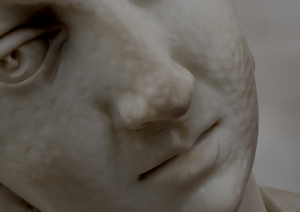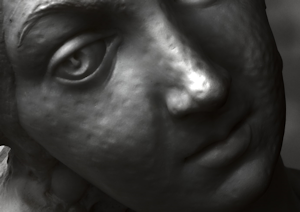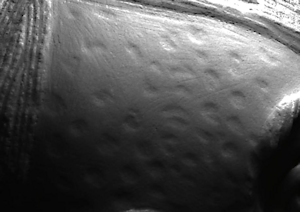
Further investigation was needed, and the team carried out a series of RTIs to assess the quality of working. As can be seen from the PTM still in Figure 16, secondary treatment is confirmed when one examines the crudity and hastiness of the work.

The marks are indiscriminately applied and there are mistakes visible both on the bridge of the nose and below it where an inappropriate tool has scored a line through Bushnell's finely finished carving of the upper lip. Figure 17 enables comparison between the secondary treatment and associated mistakes to the much finer carving around the eyes and eyebrows.

The blemishes in Figure 17 look as though they were created by a much less practised hand, whose intentions were different from those of the original sculptor. This phenomenon is demonstrated even more clearly in Figure 18, where one can see the ways in which the pock-marks overlie the finer tool markings from Bushnell's creation of the effigy's surface details.

This, in our view, conclusively proves the later addition of pock-marking. Bushnell's work has been described as using 'coarse' cutting (Whinney 1992, 97). The RTI results do not seem to indicate this habit, although some evidence of cutting can be seen on the forehead, under the pock-marks.
Internet Archaeology is an open access journal based in the Department of Archaeology, University of York. Except where otherwise noted, content from this work may be used under the terms of the Creative Commons Attribution 3.0 (CC BY) Unported licence, which permits unrestricted use, distribution, and reproduction in any medium, provided that attribution to the author(s), the title of the work, the Internet Archaeology journal and the relevant URL/DOI are given.
Terms and Conditions | Legal Statements | Privacy Policy | Cookies Policy | Citing Internet Archaeology
Internet Archaeology content is preserved for the long term with the Archaeology Data Service. Help sustain and support open access publication by donating to our Open Access Archaeology Fund.